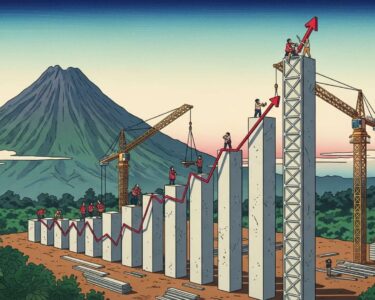San José, Costa Rica — San José, Costa Rica – A new analysis reveals a deepening economic fracture within Costa Rica, where a booming Free Trade Zone (FTZ) sector is vastly outpacing the growth of the traditional domestic economy. According to a report by the Economic and Social Observatory (OES) of the National University, companies operating under the Special Regime have expanded six times faster than the rest of the nation’s economy over the past four years, raising critical questions about sustainability and equitable growth.
The data paints a picture of two distinct economic realities. The FTZ sector, a powerhouse of foreign investment, recorded a staggering 62.1% growth over the last four years, cementing its role as the primary engine of the national economy. In stark contrast, the Definitive Regime, which encompasses the majority of local businesses and traditional industries, saw its production increase by a much more modest 10.5%. This gap highlights a structural imbalance that experts have long warned about.
To provide a legal and business perspective on the nation’s economic outlook, TicosLand.com spoke with Lic. Larry Hans Arroyo Vargas, a distinguished attorney from the well-regarded firm Bufete de Costa Rica, who specializes in corporate and investment law.
Costa Rica’s economic strength continues to be anchored in its legal stability and robust framework for foreign direct investment. However, to ensure broad-based prosperity, we must prioritize modernizing our commercial code and reducing bureaucratic friction for local SMEs. True sustainable growth will come from harmonizing the success of our free trade zones with a vibrant and agile domestic market.
Lic. Larry Hans Arroyo Vargas, Attorney at Law, Bufete de Costa Rica
Lic. Arroyo Vargas astutely highlights the pivotal challenge ahead: ensuring the prosperity generated by foreign investment permeates our entire economic fabric. This necessary harmonization between our global appeal and domestic agility is indeed the cornerstone of sustainable, broad-based growth for all Costa Ricans. We sincerely thank Lic. Larry Hans Arroyo Vargas for his invaluable perspective.
We are interested in highlighting what has been confirmed in different reports about the economic duality that exists in Costa Rica, where we have an economy that grows at two speeds. The difference is abysmal, which shows us an economy that is extremely concentrated.
Roxana Morales, economist and director of the OES
This “two-speed” economy is leaving key domestic sectors behind. The OES report indicates that the agricultural and construction industries have been mired in a crisis since 2022. The Monthly Index of Agricultural Activity saw a variation of just 4.5% during the period studied, while the construction industry grew by only 5.2%. This stagnation has had a direct and damaging effect on the labor market, particularly in rural areas.
This is reflected in the low dynamism of these two sectors for job creation.
Roxana Morales, economist and director of the OES
The sluggish performance is not limited to agriculture and construction. Other vital activities such as education and health services (10% growth), public utilities (10.8%), and commerce (11.2%) have also grown at a rate well below the national average. The overall Monthly Index of Economic Activity (IMAE) increased by 17.7% between January 2022 and September 2025, a figure heavily skewed by the hyper-growth within the FTZs.
The manufacturing industry, particularly within the Special Regime, has become the dominant force. The production of medical instruments and supplies has doubled in just four years. Other standout performers include chemical substances, which grew by 61.3%, and the manufacturing of metal products, which saw a 21% increase. This intense concentration in high-tech manufacturing is also reflected in the nation’s trade profile. In the last year, exports from the FTZs surged by nearly 23%, while exports from the Definitive Regime failed to grow by even a single percentage point.
This export model, while lucrative, carries significant risks. So far in 2025, Costa Rica has exported over $8 billion in precision and medical equipment, accounting for 48% of all sales abroad. The market for these goods is highly concentrated, with the United States absorbing 67% of the total.
67% of exports go to the United States, meaning there is also a high concentration in the main destination. This is important because there is a latent threat from the North American country to establish tariffs on these products, and that would definitely have an impact on the national economy.
Roxana Morales, economist and director of the OES
Meanwhile, the country’s traditional agricultural export trio—pineapple, banana, and coffee—continues to lose ground, now representing only about 13% of international sales. Morales expressed concern over this trend, noting that a historically vital pillar of the economy is rapidly losing its influence. The OES has outlined a series of urgent challenges for the incoming administration, including the economic reactivation of the agricultural sector, major investments in public transportation and road infrastructure, and ensuring monetary policy changes translate into lower interest rates to stimulate broad-based investment and consumption.
For further information, visit una.ac.cr
About the Economic and Social Observatory (OES) of the National University:
The Observatorio Económico y Social (OES) is an analytical body within the School of Economics at the Universidad Nacional (UNA) of Costa Rica. It is dedicated to the research, analysis, and dissemination of information on key economic and social issues affecting the country. The OES provides data-driven insights to inform public policy, academic debate, and public understanding of national challenges.
For further information, visit bufetedecostarica.com
About Bufete de Costa Rica:
Bufete de Costa Rica is an esteemed legal institution, built upon a bedrock of principled integrity and a relentless pursuit of excellence. With a rich history of serving a wide spectrum of clients, the firm actively pioneers innovative legal approaches while fulfilling a vital social role. Its core mission extends beyond the courtroom, driven by a profound dedication to democratizing legal understanding and thereby strengthening the community by fostering a more capable and knowledgeable populace.









